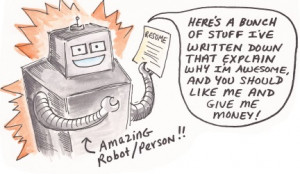By Huri Mücahit Edited by: Tomas Kazsa, Maryam Alapa, and Eileen Oni The following blog post was written after attending the iJOBS Seminar: How to Prepare for the Industry Job Market For many Ph.D. students, a career in the pharmaceutical industry is considered to be the ultimate goal. However, the job search and application process can be more daunting and lengthy than we would like. With the seminar, “How to Prepare for the Industry Job Market”, iJOBS provided an opportunity to meet with Human Resources (HR) representatives and discuss the best ways of applying for jobs at small and midsize pharmaceutical companies, such as Hengrui Therapeutics, Post-Translational Control Therapeutics, Amicus Therapeutics, and Adello Biologics. One of the most important tools that we have when searching and applying to job postings is social media, especially through professional sites like, LinkedIn. A strong LinkedIn presence is just as important as the application itself. Many of us assume that our profiles are great, however, there are several practices that set apart successful applicants from unsuccessful applicants. These include having a professional photograph or creating a robust profile using specific keywords that highlight your experience. Small changes like these can aid HR recruiters when investigating your application. According to Karen Koubek, the Director of Human Resources at PTC Therapeutics, applying to online job listings has a low rate of success because of the high level of competition. Thus using your LinkedIn network can help you find and contact someone who works within a company’s HR department and will express your desire to work for their company through a personalized message . While many representatives are often busy, you must catch their interest in the first several lines of the message and provide them with quick access to your CV and application. While this entire process might seem uncomfortable, iJOBS has recently partnered with 2Actify to teach graduate students the necessary skills for online networking (see the article on the 2Actify workshop for more information!)  Another valued practice is to use a personalized cover letter for each application. Although you might feel that a single “one size fits all” approach enables you to apply to many companies, this method is often detrimental as hiring companies see this as a lack of effort (read: laziness) and thus, a lack of interest in their company. As Lori Daigle, the office manager at Hengrui Therapeutics states, it is best to first conduct research on each company you are applying to and then tailor your cover letter towards the position you are applying for. Not only does this reaffirm your interest, it also presents a highly valuable opportunity to use several short paragraphs to tell your story providing a “human” aspect to the very dry representation on your CV. In addition, considering that the first person to look at your application will not be a biologist, your cover letter and the language used within it becomes even more important.
Another valued practice is to use a personalized cover letter for each application. Although you might feel that a single “one size fits all” approach enables you to apply to many companies, this method is often detrimental as hiring companies see this as a lack of effort (read: laziness) and thus, a lack of interest in their company. As Lori Daigle, the office manager at Hengrui Therapeutics states, it is best to first conduct research on each company you are applying to and then tailor your cover letter towards the position you are applying for. Not only does this reaffirm your interest, it also presents a highly valuable opportunity to use several short paragraphs to tell your story providing a “human” aspect to the very dry representation on your CV. In addition, considering that the first person to look at your application will not be a biologist, your cover letter and the language used within it becomes even more important.  If you are looking to immediately transition into industry, the key to making yourself stand out, according to Kurt Andrews, Senior Vice President of HR at Amicus Therapeutics, is to highlight your current level of expertise. Job postings will list the skills and training required for the respective position, as well as the number of years of experience in the field. Sarah Holmes-Klotz, the Senior Director of HR at Adele Biologics, informed us that many perfect positions for new Ph.D. graduates list 0-2 years of experience required. If the job posting states that a BS/MS is preferred but you are interested in working for the company, you can email the HR department. These positions can be a good fit for recent PhD graduates and provide an opportunity for further growth within the company. Certain careers, such as those in medical writing and regulatory affairs, do not require previous industry experience and are willing to hire new Ph.D. graduates. Ultimately, when looking to transition into a position in the pharmaceutical industry, it is helpful to follow these tips; market yourself using your LinkedIn profile, stand out by directly messaging HR representatives, and put in time and effort to create a thoughtful application. The benefit of applying to a smaller company such as those represented in this seminar, is that these companies offer on-the-job training and mobility within departments, so that you may gain experience in multiple fields. If you are interested in learning more about the companies, visit the iJOBS events page for more information.
If you are looking to immediately transition into industry, the key to making yourself stand out, according to Kurt Andrews, Senior Vice President of HR at Amicus Therapeutics, is to highlight your current level of expertise. Job postings will list the skills and training required for the respective position, as well as the number of years of experience in the field. Sarah Holmes-Klotz, the Senior Director of HR at Adele Biologics, informed us that many perfect positions for new Ph.D. graduates list 0-2 years of experience required. If the job posting states that a BS/MS is preferred but you are interested in working for the company, you can email the HR department. These positions can be a good fit for recent PhD graduates and provide an opportunity for further growth within the company. Certain careers, such as those in medical writing and regulatory affairs, do not require previous industry experience and are willing to hire new Ph.D. graduates. Ultimately, when looking to transition into a position in the pharmaceutical industry, it is helpful to follow these tips; market yourself using your LinkedIn profile, stand out by directly messaging HR representatives, and put in time and effort to create a thoughtful application. The benefit of applying to a smaller company such as those represented in this seminar, is that these companies offer on-the-job training and mobility within departments, so that you may gain experience in multiple fields. If you are interested in learning more about the companies, visit the iJOBS events page for more information.
iJOBS Blog